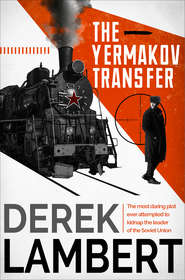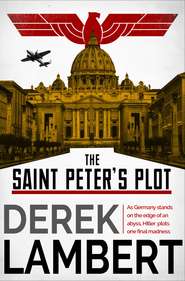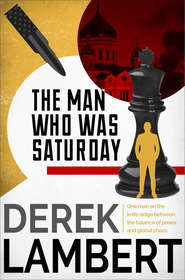По всем вопросам обращайтесь на: info@litportal.ru
(©) 2003-2024.
✖
I, Said the Spy
Автор
Год написания книги
2018
Настройки чтения
Размер шрифта
Высота строк
Поля
Anderson said it was him and, with eyes closed, listened to a complaint that water had been leaking from his bathroom into the apartment below. He told the porter to fix it, that was his job.
He abandoned the sit-ups and considered having a drink. 11.23. Too early. The road to ruin. He sat down on an easy chair, legs stretched uncomfortably in front of him, and stared at the telephone, malevolently cold and impersonal.
Where the hell was Miller? Give him time, for Chrissake. The man carrying the briefcase wouldn’t stride straight into the United Nations and hand it to the Soviet Ambassador. Perhaps Miller had lost him; perhaps the briefcase contained girlie magazines ….
He switched on the television. An old black and white spy movie, the original Thirty-Nine Steps. Anderson had watched every spy film ever made during his training in Virginia; they seemed to think that you could still learn a trick or two from James Bond. Anderson enjoyed the movies, in particular John Buchan’s masterpiece with Robert Donat because it had style and he admired style. But not today; leave Richard Hannay to his own devices ….
He switched off the television and went into the steel-bright kitchen to make coffee.
Holding a steaming mug in one hand and a chocolate biscuit in the other, he returned to the living-room. It looked unlived-in, which it was because Anderson was rarely there. A show-piece, an extravagance.
He sat down beside the telephone. Ring damn you! And it did, just as he bit into the chocolate biscuit.
He picked up the receiver, swallowed the mouthful of biscuit and said; ‘Hallo.’
‘Is that you, Anderson?’
‘Speaking. Who’s that?’
It was Miller.
Two hours later Anderson took a cab to La Guardia and caught the shuttle to Washington.
II (#ulink_5b74a26e-460c-5194-8e6b-784b030259a5)
William Danby picked up a white plastic cup of coffee; it was his fourth that morning. Danby who rarely drank liquor – an infrequent beer, the occasional weak whisky at cocktail parties – was fuelled by coffee. This morning he barely tasted it: he was too pre-occupied with the three dossiers and the typewritten report lying on the top of his mahogany desk. They worried him.
Not that Danby ever looked worried. He was a man of medium height, fifty-eight years-old; his greying hair with a suspicion of a quiff, a relic from his youth, was neatly barbered; his pale blue eyes behind horn-rimmed glasses were calm, and his features were barely lined.
Imperturbable, was how his staff described Danby. An automaton with a computer for a brain. A man who, when he removed his spectacles and stared at you with those pale eyes, withered the lies on your tongue.
Nevertheless Danby worried. If you were the head of the largest – or, arguably the second largest intelligence organisation in the world then you lived with worry. The trick was to discipline the worry, regard it merely as an occupational hazard, and never, never show it.
William Danby, director of the Central Intelligence Agency, subordinated his worry and for the first time savoured his coffee. It tasted like cardboard. He put the plastic cup to rest between the intercom and two telephones, swung round in his swivel chair and gazed over the countryside surrounding his $46 million castle close to the highway encircling Washington.
He observed the thin sunlight rekindling spring among the trees. He stared beyond the limits of his vision. From coast to coast, from north to south. The vision awed him as it always did, because he was responsible for the security of the land and the 203 million people inhabiting it.
Which was why the dossiers, two blue and one green, and the report lying on the desk worried him. He was investigating the very people responsible for the prosperity of the United States.
In a way he was guilty of the same suicidal introspection that was racking the CIA (He had just prepared a report on accusations of CIA involvement in the 1970 Chilean elections – despite the fact that the Marxist Salvador Allende had won them.)
But whereas the campaign being waged against the CIA was destructive – instigated by misguided crusaders manipulated by America’s enemies – Danby believed that surveillance of the power elite of America was, however unwholesome, necessary and constructive.
Bilderbergers had to be protected against themselves.
He swivelled back to his desk and surveyed the dossiers and the typewritten report stamped PRIVATE AND CONFIDENTIAL. The blue dossiers contained summaries of all that was known about Bilderberg and its participants; the green dossier contained all that was known about Owen Charles Anderson; the report was Anderson’s preliminary observations about the 1971 conference brought by courier from Woodstock.
If Anderson was correct, the Russians had infiltrated Bilderberg.
If he was correct …. If he wasn’t, and his investigations led to his own exposure, then the furore would equal the uproar after the Bay of Pigs fiasco. AMERICAN POWER ELITE PROBED BY CIA. Danby read the headlines of the future. It was difficult even for him to subordinate his worry.
The intercom buzzed. He pressed a button and a woman’s voice said: ‘Mr Anderson for you, sir.’
‘Send him in.’
Danby picked up the green dossier. Anderson had been his personal choice for Bilderberg. Like Danby himself, Anderson represented change.
Danby wasn’t an Ivy Leaguer like so many of his predecessors: he was a non-political professional who had learned his trade posing as a diplomat in Guatemala, Moscow and Saigon.
Anderson’s claim to represent change was his colour. He had risen meteorically through the ranks since the CIA had been accused of racial prejudice. (In 1967 fewer than twenty blacks had been employed in intelligence work for the Agency.)
A knock at the door.
‘Come in.’
Anderson, big, black and handsome, loomed in front of him.
‘Sit down.’ Anderson sat in the chair opposite Danby: occupied it, Danby thought. ‘So they all survived, huh?’
‘No casualties, sir,’ Anderson said.
Ostensibly Anderson worked for the Secret Service. He had been put in charge of Bilderberg security. The perfect cover, thought Danby, who had arranged it.
‘Any trouble?’
‘Only what I expected. Other agencies tripping over each other’s big feet. British, French, German, Feds ….’
‘Anything personal?’
‘How do you mean, sir?’
They both knew that Danby meant his colour.
‘Any resentment?’ forcing Anderson to concede.
‘You’ll always find prejudice, sir,’ smiling at Danby. There was about Anderson the faintest suspicion of cynical amusement: it had gone against him when he had been put up for the job, but Danby’s views had prevailed. They always did.
‘Your colour’s your greatest ally,’ Danby said. ‘Coffee?’ as he pressed the button on the intercom and, as Anderson nodded, ‘Two coffees, please …. With milk?’ to Anderson. ‘Yes, and sugar,’ Anderson told him.
Danby released the button. ‘Who the hell would suspect that a black security officer worked for the Company?’
‘I guess you’re right, sir, I’m too conspicuous in all-white company.’
‘Precisely.’ Danby picked up one of the blue Bilderberg dossiers and extracted the guest list. ‘You were in exalted company.’ He ran a finger down the list. ‘Chairman, Prince Bernhard of the Netherlands ….’
‘Riding for a fall,’ Anderson interrupted him.
‘Lockheed?’











